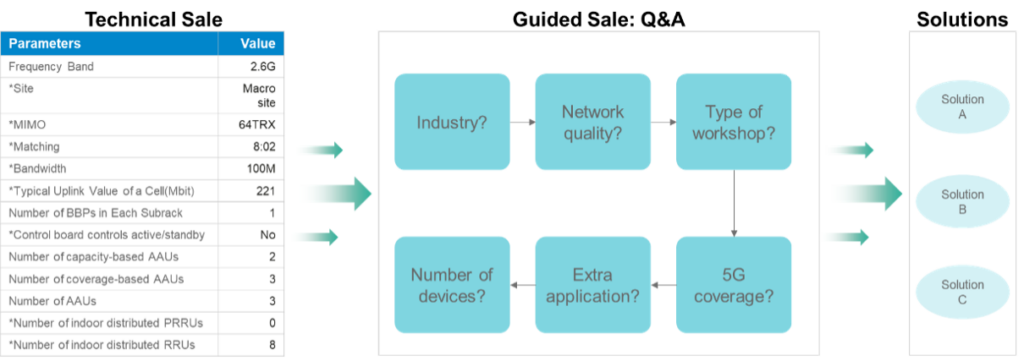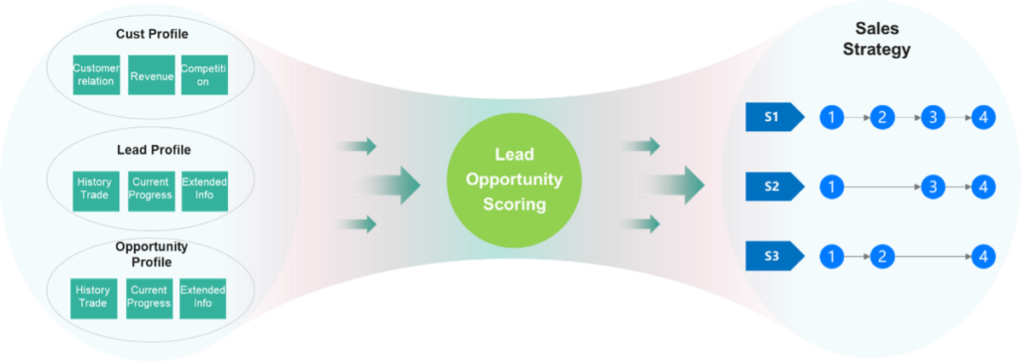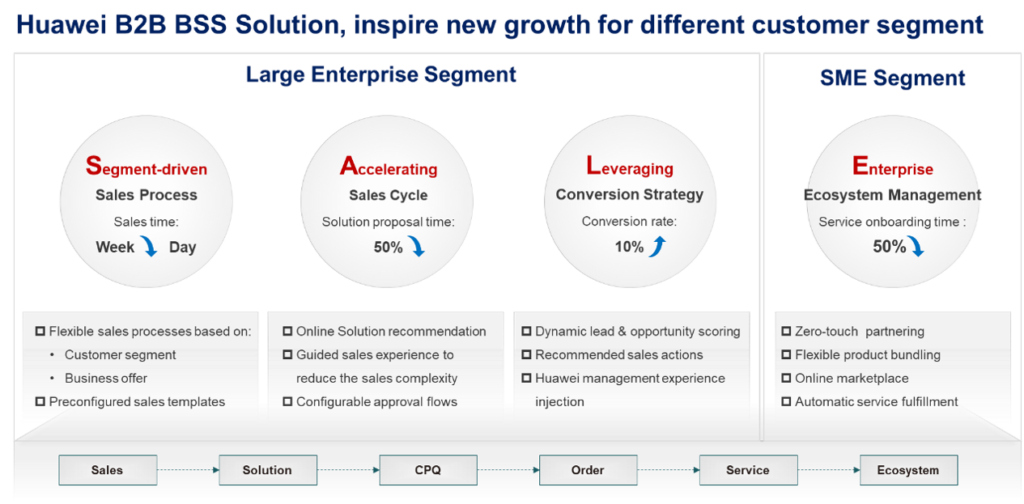blog

Capture telco B2B growth: Advice on business support system (BSS)
Business trend
As the growth of the consumer market slows down, telecommunications companies are turning to the business-to-business (B2B) market for new growth opportunities. According to the TM Forum Report, new ICT services (Cloud, Security, IoT) will be the catalyst for this growth. This trend is already evident in the recent development of large telecommunications companies.
For instance, China Mobile’s revenue from DICT (Data Technology + ICT, including cloud, 5G private network, IDC, and ICT) has been growing over the past 5 years, surpassing half of the total B2B revenue by 2022.
Challenges
Nevertheless, according to our survey, Telcos are facing many critical challenges in the existing support system while exploring B2B territory:
- New business: Various business scenarios from new ICT businesses (IoT, Cloud, and Security), bundled solutions in particular, require new capabilities beyond the existing support system, such as complex solution generation, and faster TTM.
- New market: Many new competitors, along with new businesses, are entering the market, such as cloud service providers, integration service providers, and vertical solution providers, which makes it more difficult for new acquisition and conversion.
- New model: Compared with traditional direct and distributed sales, new models like B2B2X are more likely to appear in the B2B market, which cannot be managed properly in the existing support system.
Understanding and proposition
According to a recent report from McKinsey, Telcos need to be aware that different types of enterprise customers have different relevance of use cases (capabilities). For example, for large enterprises, Telcos should focus more on sales efficiency and conversion, while for SMEs, customer lifecycle management and shopping experience should be prioritized. Based on our investigation, Telcos have to consider building different capabilities for different customer segments in the support system.
| Customer Segment | Business Requirement | Key Consideration |
| LE (Large Enterprise) | Custom solution | Lead acquisition, sales efficiency, solution generation, conversion rate, sales process management |
| SME (Small and Medium Enterprise) | Standard product | Bundled product (including partner service), online transaction, delivery automation |
Therefore, we suggest Telecommunication companies establish a new support system to facilitate the operation of new B2B businesses provided with differentiated scenario solutions that cater to different customer segments. Specifically, two distinct scenarios should be addressed: one for large enterprises (LE) and another for small and medium enterprises (SME).
Scenario Solution 1: LE + Solution
Given that LEs focus more on the custom solution, complex process, high conversion, Telcos should build the corresponding capabilities in the Sales to Order. To be precise, the 3 core capabilities should be taken into consideration.
Differentiated sales process
According to the study on the enterprise business of China Mobile, different supporting capabilities are required for different business scenarios as below.

For cloud service (resource service in particular), compared with the dedicated access service, it is much simpler and standard and focuses more on the basic sales and pricing capability instead of complex negotiation. Even for the basic functionalities, there is still a difference between the sales process, for example, the cloud requires the creation of a cloud account from the cloud service provider mainly as a SaaS service, while dedicated access service requires the field survey to validate the feasibility of the installation.
For ICT service (cloud+network+X), the offerings are more complex and normally composed of multiple non-Telco services from 3rd parties. The sales process and solution are also complicated, sometimes involving project management. The operation of this type of service requires full capability from pre-sales to post-sales, especially with higher requests on the lead, opportunity, and CPQ functionalities.
Telcos have to provide differentiated sales processes to support the operation of different businesses.
Efficient solution proposal
With the evolution of new businesses, sales representatives are being confronted with increasingly demanding tasks. For instance, the DIA (dedicated internet access) service requires the sales representatives to complete more than 20 parameters. The ICT services are even more complicated, there are tens of thousands of offer combinations to choose from; How does one go about analyzing and selecting the most suitable offers?
To enhance sales efficiency, Telcos have to provide the capability of efficient solution proposals based on a guided selling model. Let’s take a 5G-based network service for example, instead of filling the tens of complex technical parameters, now sales reps can proceed with step-wisped guidance based on business-centric Q&A, after which the system will automatically generate the relevant solutions. This will largely liberate the sales reps from time-consuming work with high efficiency to focus on more productive work like customer engagement.

Productive conversion
The ways to develop opportunities vary considerably for different customers, so it is of great importance to build productive strategies to enhance the conversion rate. The key point here is to build a more accurate scoring model based on the comprehensive insight of the customer and opportunity using AI/ML, on top of which, the system should automatically evaluate the opportunity and provide respective recommendations on how to proceed with the sales like next action, sales tactics, etc.

Scenario Solution 2: SME + Ecosystem
Unlike LEs, SMEs prefer standard or bundled products, regardless of whether they are Telco or non-Telco products. Due to SMEs themselves which are typically constrained by a limited budget and have a desire for efficient business practice, they tend to prefer a more simplified approach to online transactions. In addition, SME partners want to manage products and settlements efficiently. As a result, Telcos must take the following factors into account when operating for SMEs:
- Partner lifecycle management for partner/product onboarding, pricing, bundle, and settlement.
- B2B online marketplace for online transaction and service fulfillment.

Huawei solutions
Based on decades of practice in the B2B market, Huawei has built complete B2B solutions with different features for different customer segments.

New challenges will always arise, so it is crucial to stay open-minded and collaborate closely with partners to develop innovative solutions and make progress together.
Reference case
Huawei offers comprehensive B2B solutions to China Mobile (Province G), catering to millions of enterprise customers and resulting in a CAGR revenue increase over the past 5 years. The success of this solution has led to its replication in other provinces throughout China.
Sponsored by:
